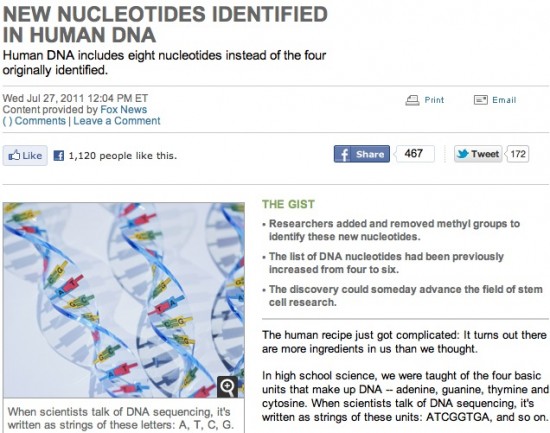
An old Discovery News article has recently been making its rounds on Facebook, which was claiming that “new nucleotides” were identified in human DNA. Users were quick to rant and rave about how game-changing this piece of news is. I read claims about how they’d need to retake biology courses now and how this could have implications on artificial life.
DNA is composed of four canonical bases. Canonical, because they are the classic bases in Watson and Crick’s double helix. That is, four chemical letters that compose genes—adenine (A), thymine (T), guanine (G), and cytosine (C). These are the A’s, T’s, G’s, and C’s you see in biology textbooks. What users took the news to be was that there were new letters to add to these. To be fair to those misled, the title was technically accurate (New Nucleotides Identified in Human DNA from Discovery News on July 27, 2011). There are two new nucleotides previously unknown. However, contrary to the subsequent speculations of those I read, the discovery doesn’t demolish or revolutionize anything that we’ve already known about what genes are. A’s will still always pair with T’s and G’s will always pair with C’s. There are no secret letters strewn throughout the genome (at least, for life here on Earth).
The finding, as the article later explains, is that there are two new modifications discovered of the canonical nucleotide cytosine and not that there are somehow new forms of genes that code for alien proteins. This is in addition to the two previously known modifications.
Cytosine has long been known to incorporate chemical groups that influence how genes are expressed. The study of this is called epigenetics. By altering the shape of DNA molecules, the modifications of cytosine can change how enzymes in the body access genes, preventing some genes from being read. As researcher Yi Zhang of the Howard Hughes Medical Institute opined, their work could lead to better control of how stem cells develop.
At the end of the day, your genetics classes don’t need to revamp their curricula and, no, you don’t have to forget what you learned in school. Surely, epigenetics is a fascinating field that is needed to augment our current understanding of how simple chemicals order each other around to make thinking human beings. And, while speculation is at the root of all scientific discovery, we must always be careful to temper it with skepticism and fact-checking.


Does the screenshot say "content provided by Fox News"? Then I am not surprised with the factual errors and misrepresentations.
Science reporting is suffering from bias and churnalism.